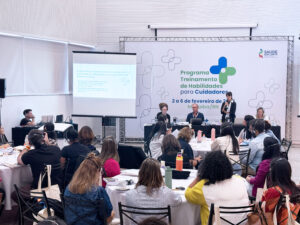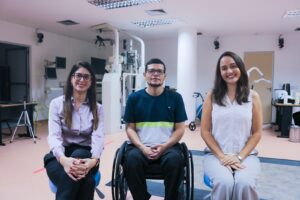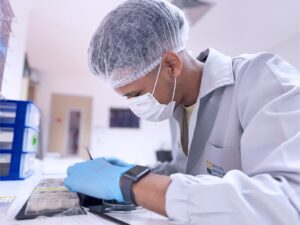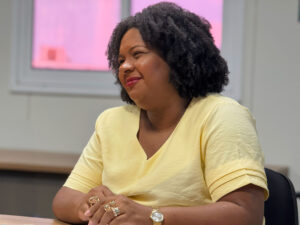Considered the best and most complete food for babies, breast milk helps prevent infections, promotes the bond between mother and child and provides food security from the beginning of life. To raise awareness about the importance of breastfeeding for child development, the World Health Organization (WHO) in partnership with the United Nations Children's Fund (UNICEF) created the Golden August campaign in 1992, during which actions are promoted to encourage the practice of breastfeeding. According to the WHO and UNICEF, approximately 6 million lives are saved annually due to the increase in exclusive breastfeeding rates until the sixth month of a baby's life.
Despite the existing evidence on the benefits of breastfeeding, according to the WHO, only 391% of Brazilian babies are exclusively breastfed until they are five months old. The Organization recommends exclusive breastfeeding for the first six months of life, followed by continued breastfeeding with appropriate complementary foods until two years of age or more, without any need to interrupt breastfeeding during the introduction of solid foods. Among the benefits of breastfeeding are the lower prevalence of infectious diseases such as pneumonia, gastroenteritis and otitis, in addition to the medium and long-term effects, which are related to the lower prevalence of allergic diseases, obesity and dyslipidemia.
ISD nurse preceptor Monise Pontes, a specialist in women's health, says that the 2022 Golden August campaign, whose theme is “Strengthening breastfeeding through education and support”, aims to reinforce the importance of health education actions to preserve the practice of breastfeeding. “This education must happen to the family before birth and continue after birth, and must also extend to the rest of society, always reinforcing the importance of breastfeeding, seeking to support the woman, uniting her, the child, the family and society at this time”, says Monise.
According to her, it is common for many women to have doubts when starting the breastfeeding process. Often, these doubts are amplified by widespread myths about breastfeeding, which end up harming the process. In these cases, the preceptor emphasizes the importance of having a health system capable of answering all the questions that these women may have, providing support and security. “It is important that these professionals answer all the questions related to this moment, in addition to paying close attention, because a difficulty can be crucial for the development of breastfeeding according to the recommendations. Sometimes pain interferes a lot in this process, for example, so we need to identify these difficulties and strengthen the woman at that moment, showing openness to her in whatever she needs”, she adds.
Milk banks
Created to ensure access to the benefits provided by breastfeeding for babies who are unable to receive direct breastfeeding from their mothers, milk banks are facing low stocks in Rio Grande do Norte. According to the coordinator of the Milk Bank, Ana Zélia Pristo, the month of July usually sees a drop in donations due to the combination of school holidays and June festivities. “We are currently in a difficult time, with low stocks, because we are on vacation. The month of July is always a bit hectic, we know that our state has many celebrations during this month. It is a time when people do not usually prioritize donations,” explains the coordinator.
According to her, in order to meet the needs of maternity hospitals, which are dealing with many cases of premature births, it is necessary to have at least 15 liters of milk available for distribution per day. “Currently, we are only able to distribute a maximum of six liters, excluding those that are made in the form of direct donations in private hospitals,” says Ana Zélia. Donations can be made by any woman who is producing excess milk. It is possible to contact the Milk Bank Coordination directly, located at the Januário Cicco Maternity School (MEJC). The Milk Bank has landline and WhatsApp contacts, through which interested parties can also ask questions about the donation process. The bank is open every day, from 8 am to 5 pm.
“Breast milk is the best milk available for babies. Our donations occur in two situations: either when the mother is unable to breastfeed, or when the baby is unable to suckle. In the latter case, the baby is usually premature. This year, World Breastfeeding Week has the theme 'Strengthening breastfeeding through education and support', and it is aimed precisely at understanding that supporting breastfeeding is supporting the future, and this also involves the possibility of providing these babies with access to breast milk”, adds the coordinator.
World Breastfeeding Week
World Breastfeeding Week began in 1992, on the initiative of the WHO, in partnership with UNICEF. Since 2016, the date has been aligned with the Sustainable Development Goals (SDGs) and, in 2018, a resolution of the World Health Assembly endorsed the role of the Week as an important strategy for promoting breastfeeding.
Service
You can contact the Milk Bank to ask questions about donations using the following numbers:
(84) 9 9135-8217 (WhatsApp)
(84) 3342-5800 (Landline)
Text: Mariana Ceci / Ascom – ISD
Photograph: Naomi Lamarck / Ascom – ISD
Communication Office
comunicacao@isd.org.br
(84) 99416-1880
Santos Dumont Institute (ISD)
It is a Social Organization linked to the Ministry of Education (MEC) and includes the Edmond and Lily Safra International Institute of Neurosciences and the Anita Garibaldi Health Education and Research Center, both in Macaíba. ISD's mission is to promote education for life, forming citizens through integrated teaching, research and extension actions, in addition to contributing to a fairer and more humane transformation of Brazilian social reality.













